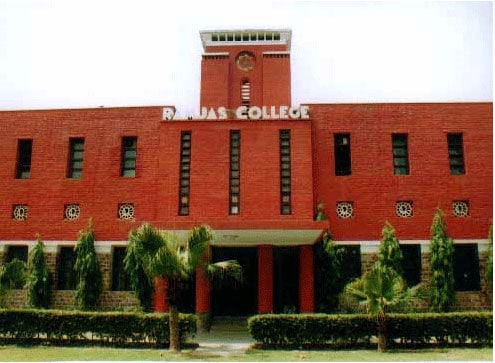On March 19 2023, the last day of the DU Lit Fest, SFI workers gathered to protest against a speaker session with Dr. Subramanian Swamy and were allegedly physically attacked by unidentified persons.
The Delhi University Literature Festival, organised on Ramjas College grounds from March 17–19, has been subject to a series of allegations by organisations such as Students’ Federation of India and the All India Students’ Association, with the latter accusing the event of holding right-wing political affiliations. On March 19 2023, a protest by SFI during a speaker session with Dr. Subramanian Swamy was shut down by the beating and manhandling of the protestors by assailants, who the SFI alleged are affiliated with the Rashtriya Swayamsevak Sangh.
“On 19, we decided to show our dissent with placards, and as soon as we marched towards the stage—we were some 20-25 activists—first the organising team members tried to stop us. After 10–15 seconds, almost 40–45 people, who may be students or may not be students, I don’t know what student wing they were affiliated to, but they were affiliated to RSS — for sure I know that — started chanting slogans like ‘Jai Shree Ram’ and ‘Vande Mataram’ and started pushing and beating us. They beat 5–6 of our activists pretty badly, including me, and pushed us outside the college gates. The security did not do anything. What was shocking for us was that a professor of Ramjas College itself, Chemistry Department, also started to beat us.”
Abhishek, SFI DU Convenor
In a press release, SFI alleged that the assailants “hurled abusive remarks on the students” and “physically pushed the female students”. Referring to the security officials as “mute spectators”, they accused them of not trying to stop the alleged attackers. SFI further described the program as “a PR event for BJP under the garb of a Literature Fest”, and alleged the use of “cheap tactics involving muscle power to silence them (the protesting students).”
The organising team of the DU Lit Fest has hit back at these allegations, stating that the event was “not politically motivated in any way” and was merely an expression of ideas which “did not belong to the political left.”
A volunteer and member of the organising team for the DU Lit Fest, who wished to remain anonymous, felt that the claims were “exaggerated” and “twisted into a narrative”.
Being a part of the organising team, I never felt that any political ideology or political party inspired us. Students, not just from DU, from various colleges and institutions, were very excited and joined. A lot of the authors that came to DU Lit Fest were the ones who had come to Bharat Book Club, which comes under Historical India, for their book launches. You will hear that they are rightists and all, but if you would’ve actually gone to the book stalls, you would find books from various ideologies and various authors.
– Anonymous volunteer at the DU Lit Fest
A student who volunteered at the Festival told us that it was but natural for the organisers to try to stop a “screaming” protest, even a peaceful one, at a large-scale event they had worked very hard to organise.
Similar sentiments were echoed on social media channels, where the apparent and presumed fest organisers called SFI’s videos “full of misinformation and misleading statements”, referring to the diversity in the rest of the talk sessions and the hard work put in by students behind the event.
Read also: AISA Organises People’s Literature Festival, Condemns DU Lit Fest as ‘BJP-RSS Propaganda’
Featured Image Credits: DU Beat
Sanika Singh
[email protected]



